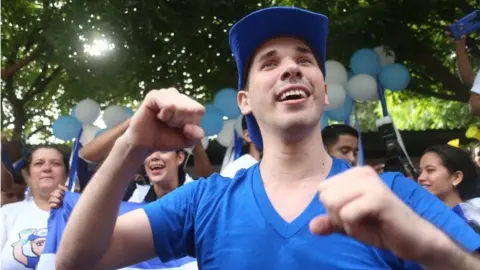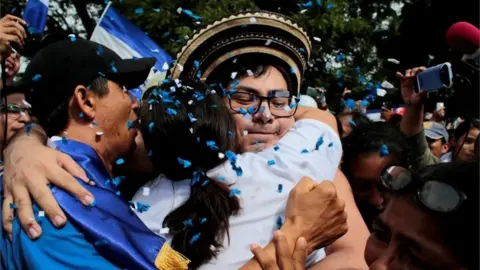Nicaragua frees 56 protest leaders as part of amnesty
Fifty-six activists who led anti-government protests in Nicaragua have been released from prison.
The move comes just days after Congress passed a controversial amnesty law.
While the release of the activists has been welcomed by rights groups, the new law has been criticised for offering an amnesty to the security forces as well as the activists.
The security forces have been accused of using disproportionate force and engaging in extrajudicial executions.
Opposition groups say the amnesty law will make it impossible to bring those who committed human rights abuses to justice.
Student leader Edwin Carcache, who was among those freed, said "the government wants to trick us with that famous amnesty law, we know that the only thing they want is to hide their crimes - but the world knows what's going on".
 AFP
AFPUnder the new law, those who are released also have to "refrain" from future protests.
The Interior Ministry said 56 people "detained for crimes against common security and public tranquillity" had been handed to the International Committee of the Red Cross on Tuesday.
Among them were student leaders who were at the forefront of anti-government protests which began to sweep across the country in April 2018.
 Reuters
ReutersCristian Fajardo and Yubrank Suazo, two of the students freed on Tuesday, were received with street parties in their hometown of Masaya and their supporters shouting "the people, united, will never be defeated".
Staggered release
The 56 activists released on Tuesday are not the first to be freed by the government. On Monday, 50 rank-and-file protesters were let go from prison and there have been other releases even before the amnesty law was passed on Saturday.

Read more about Nicaragua's crisis:
But opposition groups say they will not rest until all of the more than 700 people detained in connection with the anti-government protests are freed, and the regional body Organization of American States (OAS) has set a deadline of 18 June for their release.
Opposition umbrella group Civic Alliance for Justice and Democracy has made their timely release a precondition for resuming talks with the government.
'Grave rights violations'
Previous talks have stalled with President Daniel Ortega refusing to meet the opposition's demand for early elections.
The opposition accuses Mr Ortega, who has been in power for 12 years, of being an autocrat who does not hesitate to crack down on dissent.
More than 320 people have been killed and 2,000 injured over the past 14 months as the security forces and armed groups loyal to President Ortega confronted protesters.
The Office of the United Nations High Commissioner for Human Rights says it has documented "disproportionate use of force by the police, sometimes resulting in extrajudicial killings; enforced disappearances; torture and sexual violence, as well as widespread arbitrary or unlawful detentions, occasionally by pro-government armed elements with the acquiescence of authorities".
Speaking before the amnesty law was passed, UN human rights chief Michelle Bachelet warned that it "could impede the processing of potentially responsible persons for grave violations of human rights".
